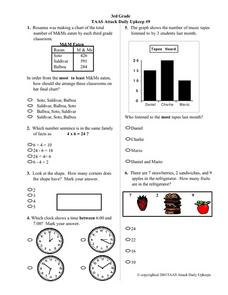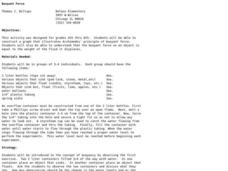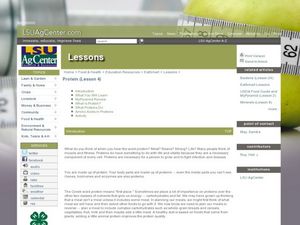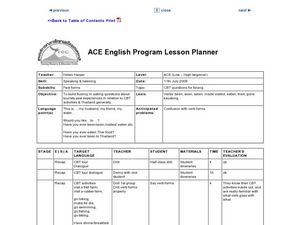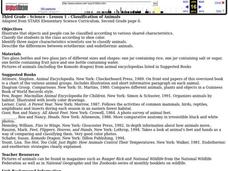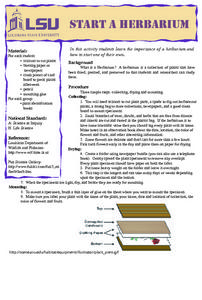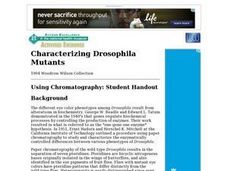Curated OER
Decomposers at Work!
Students design and conduct investigations that illustrate the process of decomposition. After a lecture/demo, students simulate the process of soil composting in the classroom. They closely chart the decomposition of their soil.
Curated OER
A Reporter's Recovery of Place
Students read and write their own story about an artifact they find in their community.
Curated OER
Science: How Tall Are Plants
First graders investigate plant growth and examine what factors contribute to plant growth. They keep a class chart of plant growth and write about and illustrate their conclusions.
Curated OER
Consumerism - Brand Comparison Lab
The student will have an opportunity for themselves to determine which brand they prefer by comparing national and store brands by their appearance, cost and flavor. They will be looking for the best economical value.
Curated OER
Building a Food Pyramid
Students review the concept of the food pyramid that has been taught by the classroom teacher. They have a classroom discussion of the food pyramid; understanding the importance of a healthy diet. Students create an original food pyramid.
Curated OER
Pie Shell - Lemon Meringue or Cream Pie Shell Demo
Students observe teacher demonstration of correct way to prepare pie shell, and identify proper techniques of preparing pie shell using basic ingredients, including lemon or cream filling and meringue or whipped cream topping.
Curated OER
Pie Crust Experiment
This experiment can be used as a pre-assessment to see what experience and knowledge the high schoolers have in preparing pies. They identify the difference in taste, flavor, texture and appearance as they substitute different...
Curated OER
Heritage: What if the Mormons had not come to Utah?
Fourth graders use critical thinking, evaluation, and geography skills to find alternative locations that Brigham Young could have taken the Mormons to settle. They present their findings to Brigham Young and the class with a short...
Curated OER
Cutting Sandwiches
Learners discuss shapes and their characteristics. As a class, they explore shapes made from a square. Students explore triangles, squares, fractions of a square such as a half and a quarter. Individually, they complete worksheets, and...
Curated OER
3rd Grade TAAS Attack Daily Upkeep #9
In this math literacy worksheet, 4th graders practice interpreting the pictographs in order to assemble the information to find the solutions to the 13 problems.
Curated OER
Buoyant Force
Students illustrate Archimedes' Principle of Buoyant Force. In this graphing lesson, students will observe that the buoyant force on an object is equal to the weight of the fluid it displaces. Students will then create a graph showing...
Curated OER
Nine Examples for Tables, Pictographs, Mean. Median, and Mode
In this graphical representation of data and measures of central tendency worksheet, students calculate mean, median, and mode and answer questions related to graphs, tables, and pictographs.
Curated OER
Protein
Students examine protein, what it is and how it functions in the body. In this protein lesson students study the food pyramid, what a protein is and what it does.
Curated OER
Past Tense Fluency
Young scholars review the past tense forms of verbs and answer have you ever questions. In this past tense lesson plan, students participate in activities to enable responding to questions about a trip.
Curated OER
There Are Algae in Your House!
Students demonstrate that, although we sometimes can neither smell nor taste them, many ingredients in our foods and household products come from the sea. They also investigate food eat to determine algae derivatives they contain.
Curated OER
Is There Seaweed/Algae in Your Food?
Students discover that seaweed/algae is a small part of the resources the oceans provide. By investigating common household products, students discover that human senses are not enough to detect the presence of seaweed/algae in food.
Curated OER
Changing unhealthy eating habits
Young scholars identify the elements of a balanced diet, then compile a daily diet and exercise log to assess their lifestyles and improve them if applicable. They recognize and explain the importance of proper nutrition practices.
Curated OER
Worms in a Bottle
Students gain a better understanding of the worm and its role in the recycling of organic materials into simpler forms by constructing worm bottles and observing for 60 to 90 days.
Curated OER
Classification of Animals
Third graders practice classiyfying items and identify three major characteristics scientists use to classify animals. They describe the differences between ectothermic and endothermic animals.
Curated OER
Metrics
Students discover the need for a universal measurement system. They practice using basic metric units in measuring distance and weight.
Curated OER
Start a Herbarium
Students explore importance of a herbarium and start one of their own.
Curated OER
Exploring the Food and Dining Patterns of Cameroon: Classification Activity
Students practice using new vocabulary on the dining practices of Cameroon. Using classification techniques, they put words into different categories. As a class, they review and discuss the answers.
Curated OER
Graphing Galore!
Students practice sorting and counting different objects. Using this information, they create graphs on a worksheet given to them. They describe and analyze the results and discuss them as a class to end the lesson plan. They also...
Curated OER
Characterizing Drosophila Mutants
Learners investigate wild-type and several mutant varieties of Drosophila melanogaster, which are characterized and distinguished according to pteridine pigments. They discoverthat paper chromatography of the wild-type Drosophila results...











